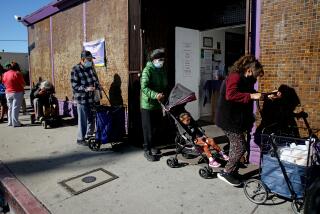EAST LOS ANGELES : Program Eases Strife in Latino Families
- Share via
Nine-year-old Delmi Zapien wears a headband to hold back her long, straight hair that she was pulling out at the sides just a few months ago. Her nervous habit and unsettling notes in a journal alerted a teacher at Harrison Elementary School that there was trouble at home.
The teacher referred the family to the Latino Family Preservation Project, an organization founded in April to reduce the number of Latino children placed in foster care. That led them to social worker Margie Navarrette, who for the last three months has visited Delmi and her family in their City Terrace home once or twice a week to help them resolve their problems.
Social workers such as Navarrette and aides work with families to teach discipline, housekeeping, how to get help from government agencies and how to keep track of their children’s progress in school. They also offer counseling on family problems such as physical and emotional abuse and alcoholism.
“We’re hoping that by these projects, we can reduce the number of children placed out of the home,” Director Alfonso Garcia said.
Often, social workers from the county Department of Children’s Services take children from abusive families and place them in foster care until the family resolves its problems. Last year, 126,000 Los Angeles County children who were victims of physical, sexual and drug abuse, neglect, exploitation and other problems in were placed in foster homes, according to county statistics.
“We tend to believe that everybody’s the same, but actually, that’s not true,” Garcia said. “We were sending people to parenting classes where no one spoke their language.”
From the program’s start to the end of 1992, it helped 313 families with 718 children. Of those, only 10 children from five families had to be placed in foster care, Garcia said.
With a $900,000 budget from the county Department of Children’s Services, Garcia’s staff of 27, including 15 social workers, serves four ZIP codes in portions of Boyle Heights, City Terrace and East Los Angeles. Garcia is asking the county to double the number of social workers to cover a wider area and hopes to someday expand services to Compton and South-Central, where many Latinos live.
Delmi’s mother, Elisa Zapien, graduated last week from her 30-member parent group at Harrison Elementary, marking a shift in her three-month involvement with the program. Zapien, 49, said she has health problems and was under stress to pay bills and support her family, and wound up taking it out on her daughter.
Zapien now calls Navarrette only for emergencies instead of meeting with her weekly, and her parent group will meet once a month instead of weekly, as it did when the group was on the project’s client list. And Delmi, who has never known her father and was feeling the turmoil at home after her 18-year-old sister ran away, no longer pulls her hair.
“Since she was little, she pulled at her hair,” Zapien said. “The primary thing is the communication between children and parents. We’ve always communicated, but now she’s not as nervous. A lot of things have changed, but I didn’t know (problems) existed before this program.”
Navarrette said Zapien, like many parents, did not want to admit that she was abusive. But after she learned new ways to discipline her children, such as taking away privileges, she realized that hitting and yelling can be abusive.
Navarrette said many families have come to think of view her as part of the family after getting over their fear that she was there to take their children away.
“Most of these families do not want us to come here at first,” Navarrette said. “They say: ‘What can you teach me? I’ve raised kids already. Why are you telling me I’m abusive?’ It takes time and commitment and they start seeing us in a different light. They see that we help them.”
More to Read
Sign up for Essential California
The most important California stories and recommendations in your inbox every morning.
You may occasionally receive promotional content from the Los Angeles Times.













